Vietnam's foreign relations after the 13th National Party Congress
Studying the above content in the Political Report, it can be seen that Vietnam's foreign policy of the 13th National Congress is basically unchanged, a continuation and inheritance from the 6th and 7th National Congresses.
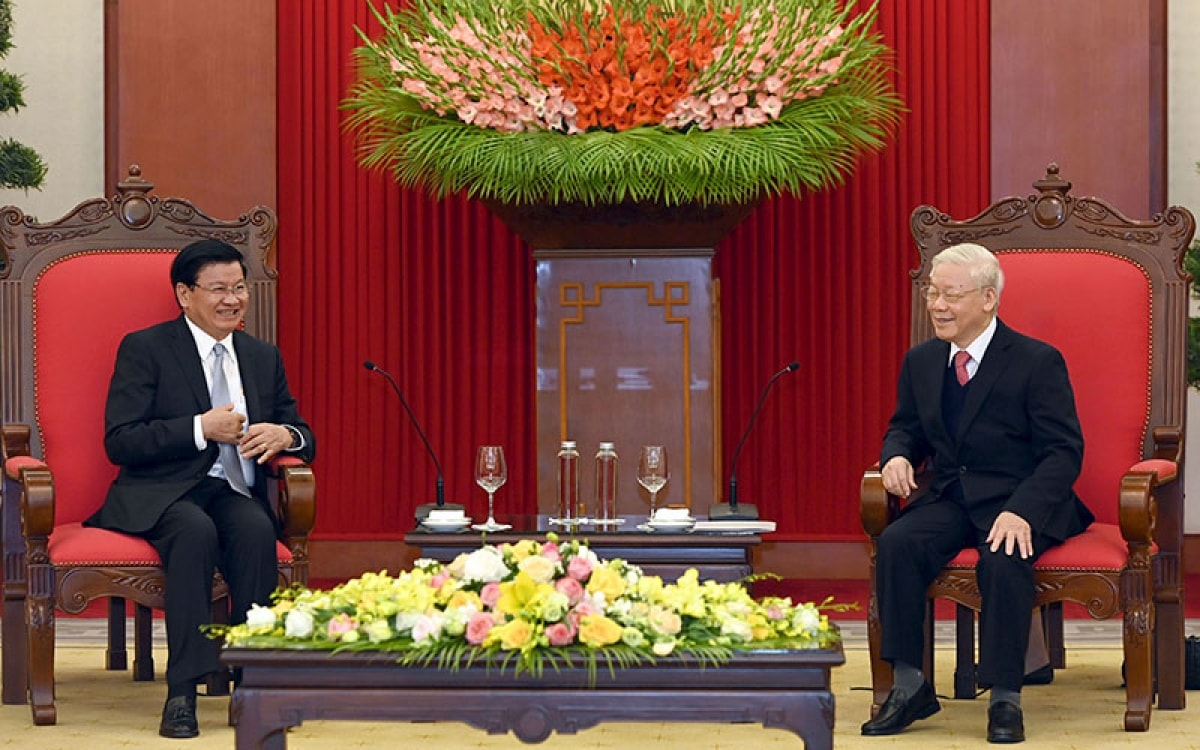 |
| According to the Political Report, it can be seen that Vietnam's foreign policy at the 13th National Congress is basically unchanged, a continuation and inheritance from the 6th and 7th National Congresses. |
According to the Political Report at the 13th National Party Congress, Vietnam's foreign relations after the 13th National Congress will be based on the policy of:
- Both cooperate and fight.
- Promote bilateral diplomacy and raise the level of multilateral diplomacy.
- Proactively participate and promote Vietnam's role in multilateral mechanisms, especially ASEAN, the United Nations (UN), APEC, Mekong sub-regional cooperation and regional and international cooperation frameworks, in important issues and mechanisms of strategic importance, in accordance with specific requirements, capabilities and conditions.
- Attach importance to developing cooperative, friendly and traditional relations with neighboring countries.
- Proactively, positively and responsibly work with ASEAN countries to build a united and strong Community, maintaining ASEAN's central role in the regional security structure.
- Strengthen and deepen bilateral cooperation with partners, especially strategic partners, comprehensive partners and other important partners, creating intertwined interests and increasing trust.
- Proactively and actively participate in multilateral defense and security mechanisms according to new thinking on protecting the Fatherland.
- Resolutely and persistently fight and defeat all plots and interventions by hostile forces into internal affairs, violating the country's independence, sovereignty, unity, territorial integrity, national security and political stability.
- Continue to promote the resolution of maritime and aviation security and safety issues on the basis of international law, especially the 1982 United Nations Convention on the Law of the Sea.
- Proactively participate, actively contribute, and enhance Vietnam's role in building and shaping multilateral institutions and international political-economic order, fully implementing international commitments and signed trade agreements.
The implementation of foreign policy is determined to be based on three pillars, including party diplomacy, state diplomacy and people's diplomacy. If we look at Vietnam's diplomacy as a united front, we can add other types of diplomacy such as: political diplomacy, defense diplomacy, parliamentary diplomacy, cultural diplomacy, and economic diplomacy. In the context and political system of Vietnam, although there are different names and different channels of diplomacy, all foreign affairs activities are under the direct leadership and direction of the Party.
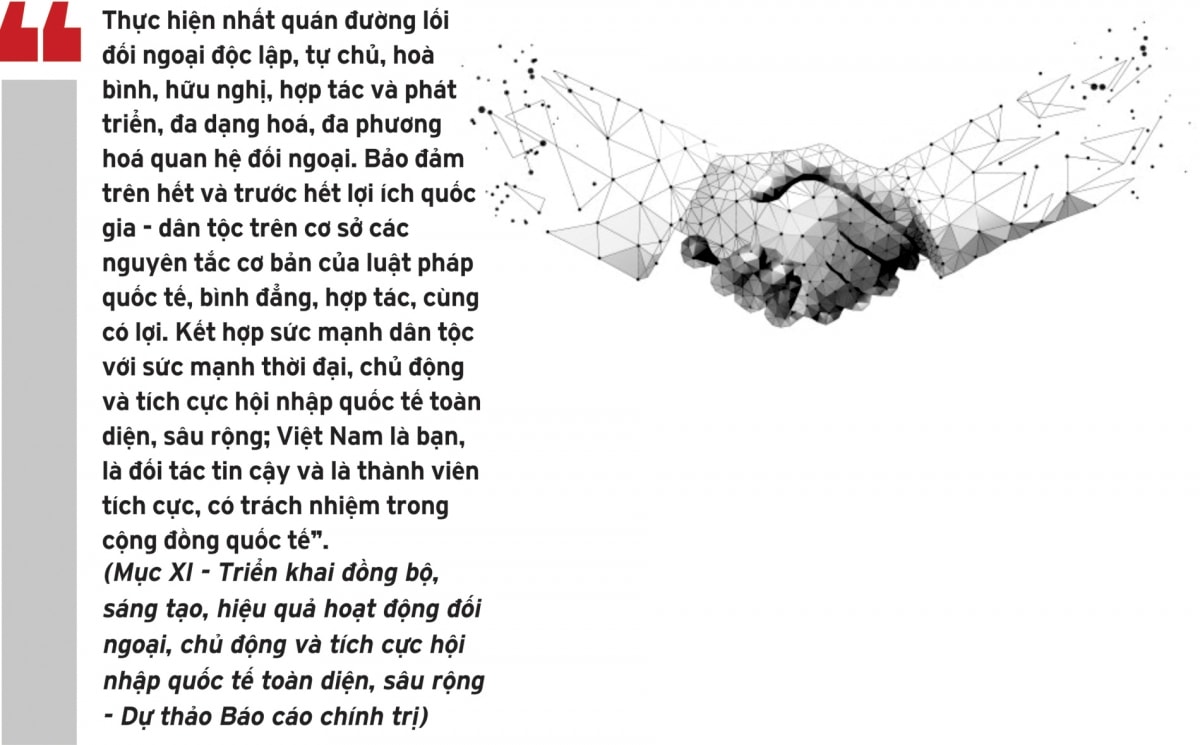
Studying the above content in the Political Report, it can be seen that Vietnam's foreign policy at the 13th National Congress has not changed fundamentally, continuing and inheriting from the 6th and 7th National Congresses with the policy of "diversifying and multilateralizing foreign relations", and especially the foreign policy at the 12th National Congress (2016). Some main points in the foreign policy at the 13th National Congress can be summarized as follows:
First, emphasis is placed on both bilateral and multilateral diplomacy. For bilateral diplomacy, the policy is to continue to “focus” and “deepen” relations, with priority still being given to neighboring countries, strategic and comprehensive partners, and other important partners. For multilateral diplomacy, the policy is to be “proactive” and “active” with priority given to ASEAN, the UN, the EU, APEC, ASEM, Francophonie, the Non-Aligned Movement, the Mekong Subregion mechanisms, and other mechanisms of strategic importance.
Second, it clearly indicates the multilateral mechanisms that Vietnam's diplomacy will aim for such as ASEAN, UN, APEC, Mekong sub-regional cooperation, other regional and international cooperation frameworks, and mechanisms of strategic importance... Compared to this part in the Political Report of the 12th National Congress, the Draft Political Report is more complete and specific. This creates awareness of flexibility and a more open approach in Vietnam's multilateral diplomacy.
Third, emphasizing the elevation of multilateral diplomacy. This is a new point in the Draft Political Report, but it affirms Directive No. 25 of the Party Central Committee Secretariat “on strengthening and elevating multilateral diplomacy to 2030” (2018).
Fourth, regarding the East Sea issues, the Draft Political Report is more specific about the scope, such as: “resolving issues of maritime and aviation security and safety at sea on the basis of international law, especially [emphasizing] the 1982 UN Convention on the Law of the Sea”. The Political Report of the 17th Congress only generally states “resolving issues at sea…”.
In terms of foreign relations, up to now, Vietnam has had diplomatic relations with 189 out of 193 member countries of the United Nations, of which it has established strategic partnerships with 17 countries and comprehensive partnerships with 13 countries; especially with Russia and India as comprehensive strategic partners, with China as a comprehensive strategic cooperative partner, and with Japan as a comprehensive and extensive strategic partner.
In addition, Vietnam is a member of many regional and international organizations; it has signed 15 free trade agreements, of which the Vietnam-UK bilateral free trade agreement and the Regional Comprehensive Economic Partnership Agreement are the latest free trade agreements.
It can be seen that, up to now, Vietnam's foreign relations have been quite deep and wide with many levels and intertwined interests. Promoting the relationship to go into depth and exploiting the full potential of each relationship will create a bustling picture of Vietnam's foreign affairs activities.

In this section, the article will discuss and analyze Vietnam’s foreign relations on both bilateral and multilateral levels selectively. On the bilateral level, the article will focus on Vietnam’s relations with 5 countries, including: Japan, India, the United States, Australia, and China. On the multilateral level, the article will focus on Vietnam’s relations with ASEAN.
Bilateral relations
All five countries - Japan, India, the United States, Australia, and China - are important to Vietnam in terms of security and strategy. The relationship between Vietnam and these countries after the 13th Congress will be based primarily on the foundation that has developed in the past, and the strategic interests of both sides in the coming time.
Japan
Since the two countries established diplomatic relations in September 1973, the relationship between the two countries has been increasingly developed and deepened in many aspects, especially with high political trust. The diplomatic relationship between the two countries has been continuously upgraded over time: Long-term and stable partnership of trust (2002); Towards strategic relations for peace and prosperity in Asia (2006); Strategic partnership for peace and prosperity in Asia (2009), and Extensive strategic partnership for peace and prosperity in Asia (2014).
Two-way trade reached 40 billion USD, and Japan is Vietnam's fourth largest trading partner. Currently, Japan is the second largest investor among 138 countries and territories investing in Vietnam. Many Japanese companies have moved their production facilities from China to Vietnam due to the US-China trade war, the competition for influence between Japan and China in the region, and Japan's desire to escape and reduce dependence on China.
Last October, Japanese Prime Minister Yoshihide Suga chose Vietnam as the first country to visit on his overseas trip right after being elected Prime Minister. It is noteworthy that his predecessor, Shinzo Abe, also chose Vietnam as the first country to visit after he returned to the position of Prime Minister for the second time (2013). During talks and meetings with Vietnamese leaders, Mr. Suga affirmed that the two countries share many strategic interests such as ASEAN's central role in the region, the East Sea dispute, and Japan considers Vietnam an important partner to achieve the goal of Japan's Free and Open Indo-Pacific Vision, which Mr. Suga announced in his speech to students at the Vietnam-Japan University.
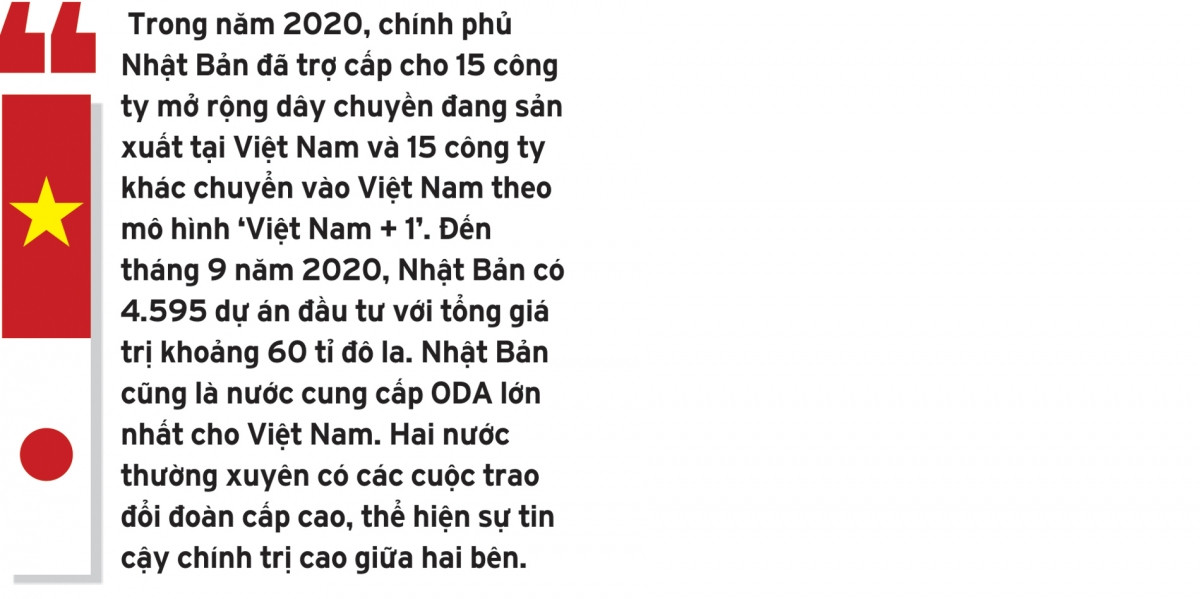
The defense and security relationship between Vietnam and Japan has significantly expanded and is substantial. In July 2020, Japan provided a credit line worth 36.6 billion yen (equivalent to 347 million USD) to help Vietnam improve its maritime safety and security capacity, including the construction of 6 new patrol vessels. During the visit to Vietnam, the two countries signed an agreement on Japan agreeing to transfer defense technology to Vietnam.
With the agreements reached in the past time, the stable political situation in both countries, it can be believed that the Vietnam - Japan relationship in the coming time will continue to be as good as it is now. There are several factors to be able to put faith in this good relationship. First, political trust has been built and solidified between the two countries. Second, both countries share common concerns about security issues in the region, interests in the East Sea, and a free, open, peaceful and prosperous Indo-Pacific region. Japan especially wants to promote and realize the Free and Open Indo-Pacific Vision, seeing it as Japan's influence strategy, while building a like-minded alliance to respond to security threats and challenges in the region. Vietnam's geostrategic position in the East Sea and the wider Indo-Pacific is of particular importance for the realization of this Japanese Vision. Third, the personal relationship between the leaders of the two countries continues to be maintained with high trust. This is an important factor in the diplomatic culture of countries belonging to the East Asian culture.
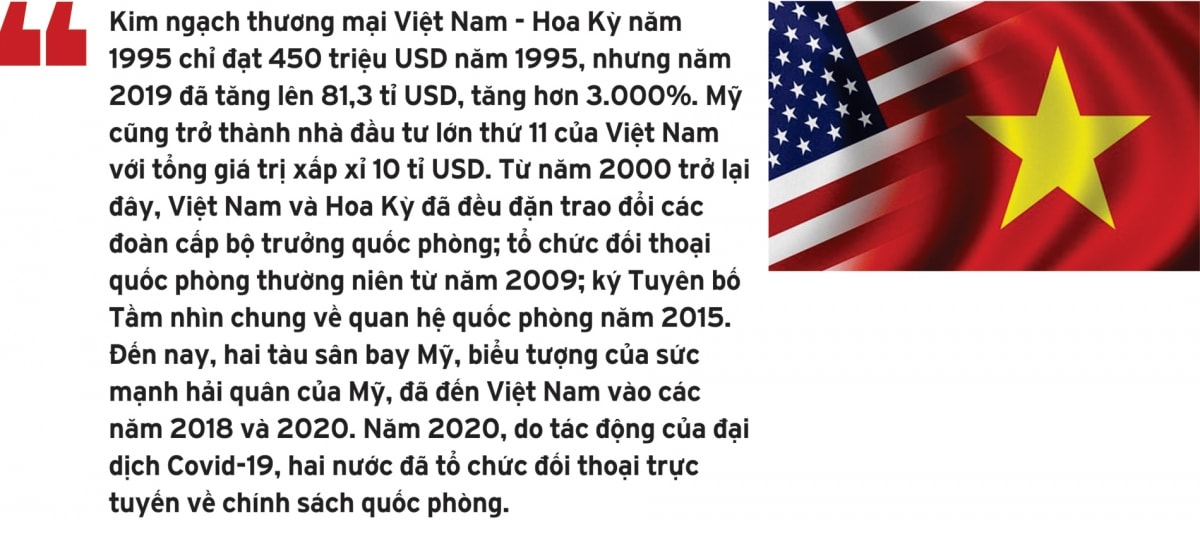
USA
In 2020, Vietnam and the United States celebrated 25 years of normalized diplomatic relations. The Covid-19 pandemic outbreak has somewhat affected this commemorative activity, but it has not prevented the general development trend in the relationship between the two countries with many shared strategic interests.
Looking back over the past 25 years, the progress in relations between the two former enemies is something that even veteran diplomats of both countries could not believe or imagine when the two countries first normalized relations. President Bill Clinton's official visit to Vietnam in 2000 marked many meanings, and was followed by US presidents: George W Bush (2006), Barrack Obama (2016), and Donald Trump (2017, 2019). On the Vietnamese side, many high-ranking Vietnamese leaders also paid official visits to the US: Prime Ministers Phan Van Khai (2005) and Nguyen Tan Dung (2008), Presidents Nguyen Minh Triet (2007) and Truong Tan Sang (2013), and especially the visit of General Secretary Nguyen Phu Trong (2015).
In the Vietnam-US relationship, economic and trade relations always come first and as Prime Minister Nguyen Xuan Phuc said when receiving US National Security Advisor Robert O'Brien in November 2020, cooperation in the field of trade is the driving force in the bilateral relationship. Defense and security relations are seen as a channel to affirm and strengthen trust between the two sides. Coincidentally, in the first month of 2021, the US has a new President and government; Vietnam has a Party Congress to elect a new Central Executive Committee and key leadership positions of the Party and State. This is both an advantage and a challenge for the relationship between the two countries.
The first and foremost advantage is that President Joe Biden is no stranger to Vietnam. He served as Vice President of the United States for 8 years in the administration of President Barrack Obama (2009-2017), during which he met twice with high-ranking Vietnamese leaders visiting the United States (2013 and 2015). Notably, during General Secretary Nguyen Phu Trong's visit to the United States (2015), Mr. Biden, on behalf of President Barrack Obama, hosted a banquet for General Secretary Nguyen Phu Trong and the high-ranking Vietnamese delegation. In his welcoming speech at the reception, Mr. Biden borrowed two verses from Kieu to describe the fateful, bright and optimistic Vietnam-US relationship, which are:
"God still let us have today,
The mist at the end of the lane clears and the clouds part in the sky"
Moreover, among the key officials in President Biden's administration, there are several who also served in the Obama administration, such as Secretary of State (pending US Senate confirmation) Antony Blinken, National Security Advisor Jake Sullivan, White House advisor on Asian affairs Kurt Campbell, and advisor on climate change John Kerry - former Secretary of State - who played a key role in shaping the Obama administration's Asia pivot policy and all supported Vietnam's important role in the previous "Asia pivot" policy and the current Indo-Pacific Strategy.
However, the first challenge is that the new US administration will need a certain amount of time to stabilize its relations with partners, including Vietnam, according to its new approach. And so there may be a lull during this time between Vietnam and the US.
The second challenge is that the new US administration will likely continue to pressure Vietnam to reduce the bilateral trade deficit. In addition, the Trump administration has left a legacy that the new administration will find difficult to ignore: the US Trade Representative’s conclusion that Vietnam engaged in unfair trade practices and the possible response to this could be the imposition of punitive tariffs. However, it is still too early and unclear how the Biden administration will approach this issue.
The third challenge is that traditionally, Democratic administrations will focus on democracy and human rights. Kurt Campbell is known to be tough on human rights. However, it is important to understand that no matter which party is in power in the US, democracy and human rights are always one of the three pillars of US foreign policy, including: economic interests, geostrategic interests, and democracy and human rights. Depending on the target, the US will prioritize implementing these three pillars. Currently, in relations with Vietnam, the first two pillars are more prominent. But that does not mean that the Biden administration will ignore the third pillar. In any case, in order not to damage the relationship between the two countries, this issue needs to be handled skillfully, not only in 2021 but also for the next four-year term.
India
Vietnam-India relations are traditional; gradually developed and strengthened under the framework of Strategic Partnership (2007) and Comprehensive Strategic Partnership (2016). The trade turnover between the two countries has also increased, from 72 million USD (1995) to 10.7 billion USD (2018). In early 2020, the two countries opened direct flights to each other's cities, and recently Vietnam imported rice from India after many decades.
The defense and security relationship between the two countries has been increasingly strengthened and is considered a pillar in the bilateral relationship. The two countries share many common views on the East Sea issue and regional security. In 2020, despite being affected by Covid-19, the two countries still held online talks between the Foreign Ministers, Defense Ministers, and Prime Ministers of the two countries. At the end of 2020, the two countries organized a "passage exercise" between the two navies in Vietnam's waters in the East Sea.
In general, the Vietnam-India relationship in the coming time will continue to be stable and expanded in the fields of economy, trade and defense-security cooperation. In addition, the Vietnam-India relationship will also develop in accordance with the framework of the "Act East" policy and the "ASEAN Vision on the Indo-Pacific region".
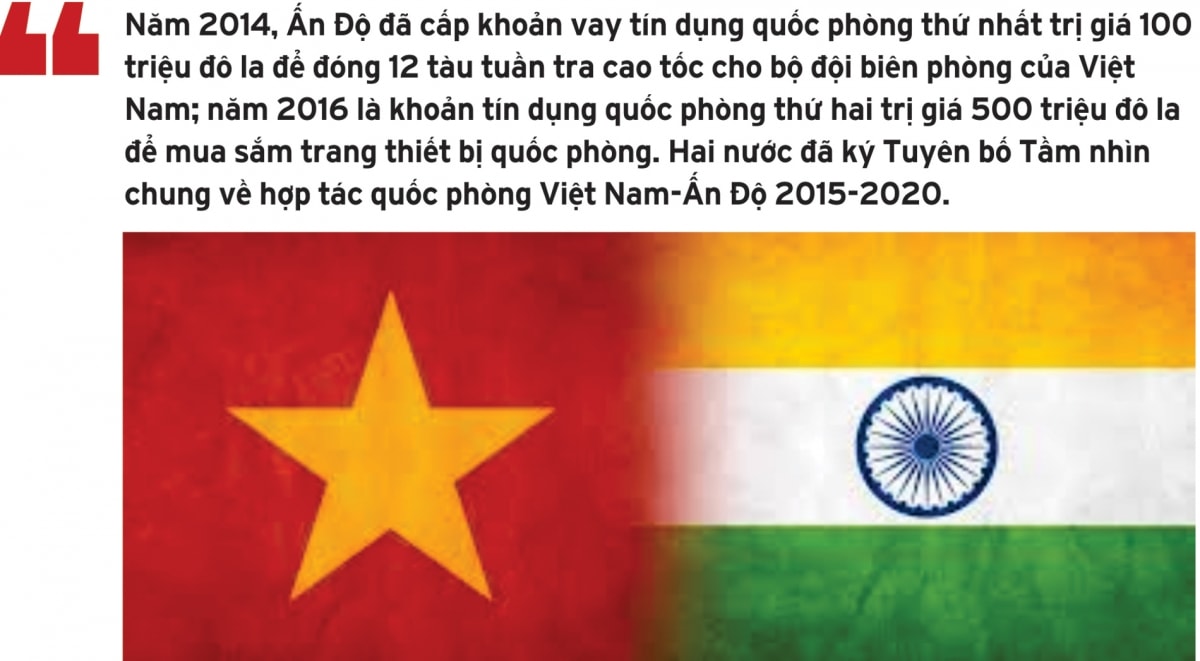
Australia
Vietnam and Australia have upgraded their relationship from Comprehensive Partnership (2009), Enhanced Comprehensive Partnership (2015) to Strategic Partnership (2018). Since the establishment of diplomatic relations between the two countries (1973), over the past 45 years, bilateral relations have developed in both trade and investment, defense and security cooperation. Two-way trade reached more than 10 billion dollars (2017), in which Australia is Vietnam's 7th largest trading partner, and Vietnam is Australia's 15th largest trading partner. Australia's investment in Vietnam currently ranks 20th out of 138 investors in Vietnam. Since 2018, the two countries have established an annual Economic Partnership Meeting mechanism.
In the field of defense and security, the two countries have established many dialogue and cooperation mechanisms; signed the Memorandum of Understanding on Defense Cooperation since 2010; Defense Dialogue since 2001 and annual Defense Ministerial Foreign Affairs since 2013; annual Deputy Ministerial Security Dialogue since 2018, and the Joint Vision Statement on promoting defense cooperation, enhancing maritime security cooperation and peacekeeping operations (2018).
Although bilateral relations between the two countries have developed well and impressively in recent times, the figures show that this development is still modest compared to Vietnam's market of more than 90 million people and Australia's market of approximately 25 million people. In the phone call in early 2021 between Prime Minister Nguyen Xuan Phuc and Prime Minister Scott Morrison, Prime Minister Morrison expressed his wish that the two countries upgrade their relationship to a Comprehensive Strategic Partnership in 2023 when the two countries celebrate the 50th anniversary of diplomatic relations. This shows the desire of Australian leaders to promote deeper relations with Vietnam. In that spirit, considering Australia's potential and position in the Indo-Pacific region, and its multifaceted strategic interests, Vietnam should be proactive and take advantage of the current favorable opportunity to promote closer relations with Australia.
China
Compared with the relations with the four countries above, the Vietnam-China bilateral relationship is always complicated, but has the most strategic significance for Vietnam.
The bilateral relationship has been continuously upgraded since 1991: Strategic Partnership (2008), Comprehensive Strategic Partnership (2009), and Comprehensive Strategic Cooperative Partnership (2013). The two countries also set out the principles and frameworks for bilateral cooperation: Friendly neighbors, comprehensive cooperation, long-term stability, looking towards the future (1999); Good neighbors, good friends, good comrades, good partners (2005), and the framework of comprehensive strategic cooperative partnership (2013).
These are important principles and frameworks in promoting and maintaining the stability of bilateral relations. However, the implementation and realization of these principles and frameworks must be flexible, proactive and placed in the context of the new situation.
China is currently Vietnam's largest trading partner, and Vietnam is China's 7th largest trading partner. For two consecutive years (2019, 2020), two-way trade turnover reached more than 100 billion USD. However, Vietnam has always had a trade deficit. This is something that needs to be reviewed and adjusted.
Frankly speaking, in the current relationship between the two countries, the border and territorial issues, especially the issue of sovereignty in the East Sea, are always the most unstable and challenging factors. The consistent viewpoint in Vietnam's foreign policy is to always attach importance to and prioritize relations with neighboring countries that share borders, including China. Therefore, in the coming time, the stability and development of the relationship between the two countries will depend on how the two countries handle the border, territorial and East Sea issues.
Multilateral diplomacy
Multilateral diplomacy here refers to Vietnam’s participation in regional and global mechanisms, organizations, and movements. Vietnam has participated and is a member of many of these multilateral mechanisms. In this section, the article only discusses Vietnam’s relations with ASEAN.
Vietnam officially joined ASEAN on July 8, 1995. 2020 marks 25 years since Vietnam became the 7th member of this regional organization. To some extent, it can be said that Vietnam's accession to ASEAN had an impact on the subsequent accession of Cambodia, Laos, and Myanmar to ASEAN, fulfilling the dream of the organization's founders of bringing all 10 Southeast Asian countries into ASEAN.
ASEAN has an extremely important position, as a direct security belt for Vietnam. Therefore, it is not surprising that ASEAN has always been considered important and a priority in Vietnam's political reports and foreign policies, especially in the past two terms. The Draft Political Report of the 18th Congress also emphasizes the position and priority in Vietnam's foreign policy towards ASEAN.
In relations with ASEAN, strategic thinking and approaches have always been adjusted over time, in accordance with the country’s strategic needs and interests. Vietnam’s policy has moved from “making more friends, fewer enemies”, “diversifying and multilateralizing international relations”, “shifting from confrontation to dialogue”, and “proactively, positively and responsibly cooperating with ASEAN member countries to build a strong community”.
Since joining ASEAN, Vietnam has twice assumed the ASEAN chairmanship, in 2010 and 2020. In 2020, under the impact of Covid-19, Vietnam led ASEAN to overcome challenges to not only maintain cohesion but also achieve new developments, both in intra-bloc cooperation and the bloc's foreign relations with external partners. Impressive figures such as: more than 500 online meetings, more than 80 signed documents, all ASEAN summits, between ASEAN and its partners were maintained and successfully held with statements that satisfied all parties. In addition, under Vietnam's leadership, ASEAN's position and voice were not only limited to the region but also raised to the global level by promoting dialogue and cooperation with the United Nations and the United Nations Security Council. In addition, Vietnam has also succeeded in creating a common voice for the bloc on the East Sea issue when the ASEAN Chairman's Statements emphasized the significance and importance of international law and the 1982 UN Convention on the Law of the Sea in resolving disputes in the East Sea.
Looking back at the past 25 years and looking forward to the next 5 years and beyond, ASEAN will always be important and have strategic significance for Vietnam in the cause of development, protection of sovereignty and territorial integrity. And that is also the challenge for Vietnam: how to contribute to maintaining solidarity within the bloc, not letting the national interests of each member country affect the common voice and consensus of the whole bloc in relations with external partners and security issues in the region. Because any disunity within the bloc will affect Vietnam's interests first. That is to say, Vietnam does not only consider its relationship with ASEAN as a strategic relationship, and needs to have a strategic relationship with each member country of ASEAN in one way or another.
The foreign policy in the Draft Political Report is basically consistent and continues the foreign policy since Vietnam began the reform process until now, especially there is not much difference compared to the foreign policy of the 12th Congress. Perhaps, in the guiding principles, the implementation viewpoint is more specific, especially emphasizing more on the "proactive and positive" nature in foreign relations.
In general, Vietnam's foreign relations after the 13th National Congress on both bilateral and multilateral levels will continue to develop in the past time, especially in 2020. On the bilateral level, Covid-19 will likely still have a certain impact, especially the implementation (if any) of visits by Vietnamese leaders abroad, or welcoming leaders and heads of state to Vietnam, until at least the first half of 2021. In addition, Vietnam's foreign relations with the US and China will be more or less influenced by the new US administration's approach to China, which may not be clear for at least another 6 months because the Biden administration is still busy and prioritizes solving domestic issues first. In that context, Vietnam is proactively approaching and promoting relations with the new US administration, and on the other hand, strengthening and deepening relations with 3 countries: Japan, India, and Australia, and other important partners.
On the multilateral front, in 2021, Vietnam will complete its role as a non-permanent member of the UN Security Council for the 2020-2021 term, and participate in activities within the ASEAN framework.
The challenges ahead for Vietnamese diplomacy are not small, but the motto "remaining constant and adapting to all changes" will still be the guide for implementing Vietnam's foreign relations in the coming time.

